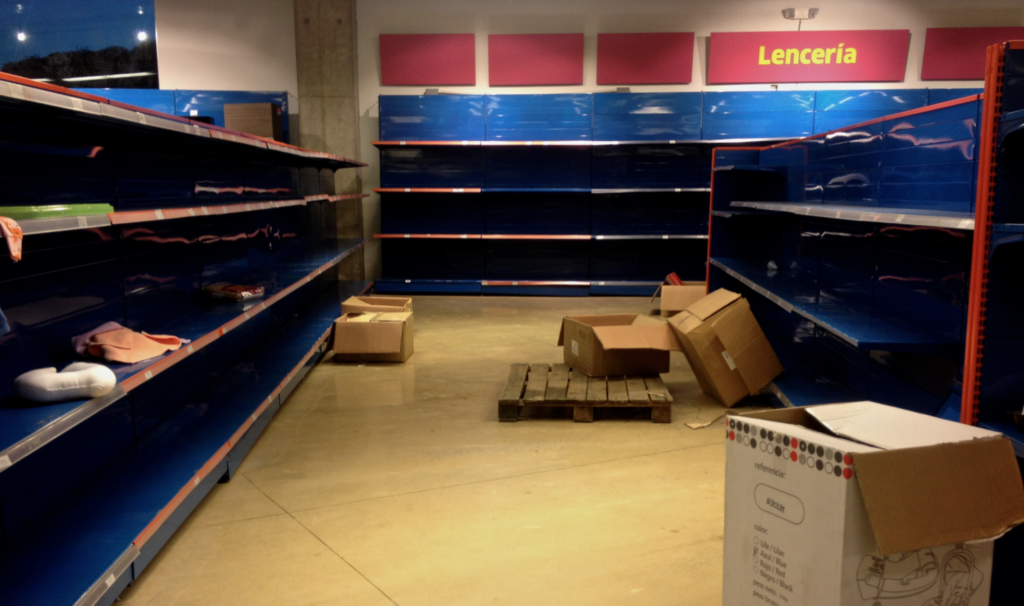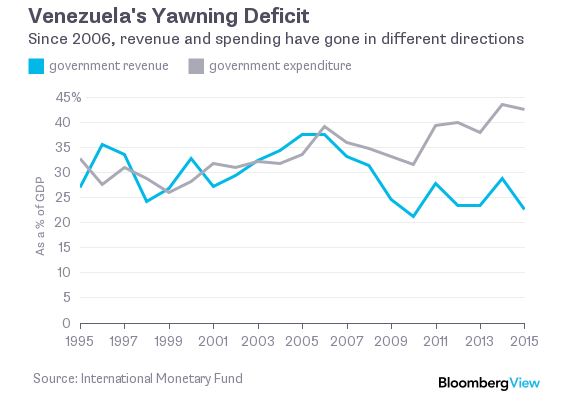With the current media spotlight on the 2016 Olympics in Rio de Janeiro, it’s worth shifting attention to Brazil’s neighbor Venezuela and its worsening economic crisis. As reported in The Atlantic last month, Venezuela “just came out of a period of electricity rationing that has been in effect since last April, during which rolling blackouts were common. In May, the country declared a state of emergency as inflation hit 180 percent, supermarket shelves emptied out, and food shortages became rampant.” The Wall Street Journal recently ran a story with the headline, “Venezuela’s Inflation is Set to Top 1,600% Next Year.”
Now, Venezuela’s economic deterioration is leading to a public health crisis, with hospitals that lack antibiotics, equipment, water, food, and other necessities – see this heart-wrenching New York Times account, “Dying Infants and No Medicine: Inside Venezuela’s Failing Hospitals.” Malaria, a disease Venezuela blotted out even before the U.S. was able to do so, is on the rise and becoming a health crisis spilling over into neighboring countries. According to this article from FoxNews, the disease is surging because people are flocking to flooded, murky old gold mines in an attempt to find some sort of income, then becoming infected with malaria from mosquitoes as they search for gold.
Venezuela was once the richest country in Latin America. So, what happened? How is a country that is “rich in oil” simultaneously “now poor in most everything else”?
As Wall Street Journal columnist Bret Stephens reminds us in his piece “What’s Socialism, Dad?”, Venezuela is a sobering case study in the failures and flaws of socialism.
The blame for many of Venezuela’s current problems rests with former president Hugo Chavez. When he took office in 1999, although there were some problems with inflation and poverty, Venezuela was still the wealthiest nation in Latin America.
But Chavez “took a dim view of capitalism and nationalized hundreds of companies. Chavez imposed many government regulations and under his rule, private businesses faced a much tougher time,” according to NPR.
Chavez also implemented policies to control the prices of goods, “but the price ceilings on basic goods have meant that many of the country’s producers stopped making those basic goods, because they could only do so at a loss.”
Under Chavez, Venezuela’s economy became heavily dependent on oil exports. The state took over the oil industry, creating a state-owned oil company, Petroleos de Venezuela (PDVSA). PDVSA in turn funded the government’s socialist programs and policies: “Chavez turned PDVSA into the financial motor of his self-styled revolution, funding everything from sports and cultural events to free health clinics and home-building programs.” This has continued under current president Nicolas Maduro.
Then oil prices plummeted, but as they did so, the Venezuelan government continued its spending. See the chart below, taken from this Bloomberg article on Venezuela, which illustrates this spending deficit.
Unfortunately, there’s not much hope for a remedy to Venezuela’s dire circumstances soon. With some economists predicting an imminent economic collapse, it seems the optimal solution would be new political leadership and fresh economic policies.
In the recent U.S. presidential primary races, the idea of socialism in America caught fire. The current crisis in Venezuela is a stark reminder that while socialism might sound appealing in theory, it does not work.
Free-market economies have and continue to provide the best opportunities for all. As Milton Friedman wrote, “So that the record of history is absolutely crystal clear, that there is no alternative way so far discovered of improving the lot of the ordinary people that can hold a candle to the productive activities that are unleashed by the free-enterprise system.” For more on the power of free markets, read The Policy Circle brief on free enterprise.

